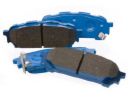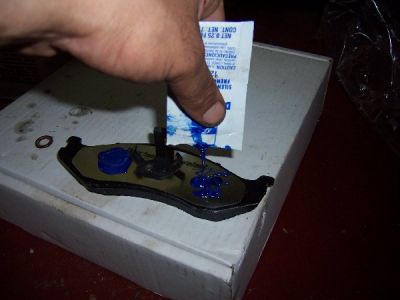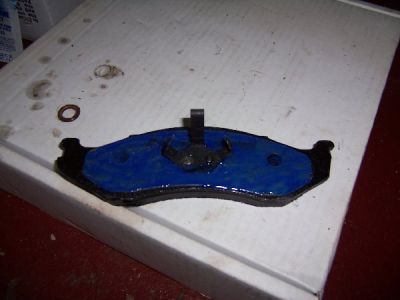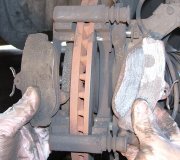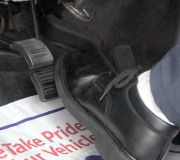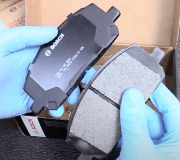Finally, someone who understands brake squeal. Racefan966 hit it on the head!
As far as "I never had to do that before", we never used to over-complicate things with unreliable computers either, and cars worked just fine. :)
We used to have brake linings made from asbestos and brake squeal was virtually unheard of. Today, you can't buy linings that cheap. Semi-metallic pads last longer but they require more pressure and, ... Well, ... They squeal.
The chamfer you put on the edges should not be too extreme because you loose the squeegee action that removes water to prevent brake fade. Experience has shown if you just remove a little material with a file so it doesn't squeal during the break-in period, it won't squeal later either. I even had good luck just rubbing the leading edges of the linings on the cement floor. If you make the chamfer too deep across the lining's surface, you loose too much friction material and in the case of a crash, even if the other guy is at fault, a good lawyer will have a field day if he finds that modification.
Remember too that manufacturers do a lot of research into designing a brake system that is balanced front to rear. Removing too much material from the pads could lead to premature rear wheel lockup. Bargain brand linings could have a coefficient of friction different than what the manufacturer designed and could lead to the front or rear having less stopping power than the other axle. Name brand manufacturers design their linings to match the original equipment to maintain balance from front to rear. If the rear brakes don't stop as hard as they're designed to, the front brakes will always work harder than normal. The corresponding overheating of the linings will cause glazing from the binders in the material. This type of squeal can often be eliminated by lightly machining the rotors. Before the resulting grooves wear off, they will chew the glazing off the pads. Sanding the linings with a course sandpaper works too but doesn't seem to be as effective.
If the anti-squeal material you're using doesn't work for more than a few weeks, try molybdenum disulfide. It is a grease, not a glue. "Moly-lube" is usually black or gray, but there is a copper-colored lube with the trade name Rusty Lube. I had real good luck with that stuff. The entire backing plate doesn't have to be coated; just the points of contact with the piston, the outer fingers of the caliper, and where the pads and caliper contact the steering knuckle or caliper mount. Caliper slide bolts should be coated lightly too.
Brake pads will vibrate. As proof, we used to have to install anti-squeal insulators that looked like heavy construction paper. When you replaced those pads, the paper was all bunched up inside the caliper's piston like a wadded up diaper. (There's a word I never thought I'd type)! The glues that come with some pads or you can get in a bottle are meant to stop the pads from moving, thereby, stopping them from vibrating. Ain't gonna happen. The pads will insist on moving, and the high-temperature greases are meant to lubricate the backs of the pads so they can move freely without setting up a vibration.
The highest quality pads seem to squeal the worst. Also, just before you install the pads and caliper, check both sides of the rotor for greasy fingerprints. Wash them off if you find any. One shop manager here in town used to make his techs get a different new set of pads if they got any spots of grease on the friction surfaces, but I've found that if you wash off any grease before the pads get hot, the grease won't soak in or cause a problem.
One last thing I don't personally recommend is cutting a slot across the short dimension of the lining, about 3/4 the way through, with a hacksaw. A lot of Hondas and Toyotas used to come with pads that were cut. Some people think it is supposed to double the frequency of the squeal so only your dog would hear it, but it is really to prevent brake fade from gasing of the linings. I did this once in an attempt to try anything to get the pads to stop squealing, ... And it worked!
Caradiodoc
Wednesday, March 25th, 2009 AT 2:48 AM
